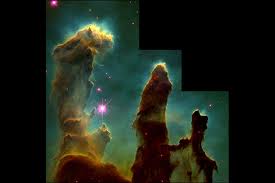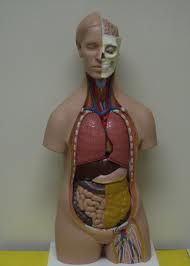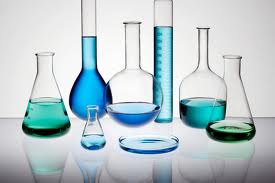-
Science Department



My mother made me a scientist without ever intending to. Every other mother in Brooklyn would ask her child after school, "So? Did you learn anything today?" But not my mother. "Izzy," she would say, "did you ask a good question today?" That difference - asking good questions - made me become a scientist.~Isidor Isaac Rabi
Tony Hicks962-8531 ext. 8301Eighth Grade ScienceJill Sierkowski962-8531 ext. 8213Seventh Grade ScienceMaegan Funk
The whole of science is nothing more thana refinement of everyday thinking.~Albert EinsteinMen love to wonder,and that is the seed of science.~Ralph Waldo EmersonThe scientist is not a person who givesthe right answers, he's one whoasks the right questions.~Claude Lévi-Strauss
-
EDISON HIGH SCHOOL SCIENCE DEPARTMENT COURSESAP BiologyBiology,Advanced Placement is a course based on the content established bythe College Board. The major themes of the course include: The process of evolution drives the diversity andunity of life, Biological systems utilize free energy and molecular buildingblocks to grow, to reproduce and to maintain dynamic homeostasis, Livingsystems store, retrieve, transmit and respond to information essential to lifeprocesses, Biological systems interact, and these systems and theirinteractions possess complex properties. A comprehensive description of this course canbe found on the College Board AP Central Course Description web page at:
AP ChemistryChemistry, Advanced Placement is acourse based on the content established by the College Board. The contentincludes: (1) structure of matter: atomic theory and structure, chemicalbonding, molecular models, nuclear chemistry; (2) states of matter: gases,liquids and solids, solutions; and (3) reactions: reaction types,stoichiometry, equilibrium, kinetics and thermodynamics. A comprehensive description of this coursecan be found on the College Board AP Central Course Description web page at:
AP Environmental ScienceEnvironmental Science, Advanced Placement is acourse based on content established by the College Board. Students enrolled inAP Environmental Science investigate the scientific principles, concepts, andmethodologies required to understand the interrelationships of the naturalworld, to identify and analyze environmental problems both natural andhuman-made, to evaluate the relative risks associated with these problems, andto examine alternative solutions for resolving and/or preventing them. Acomprehensive description of this course can be found on the College Board APCentral Course Description web page at:
http://apcentral.collegeboard.com/apc/public/courses/descriptions/index.html
Anatomy and PhysiologyAnatomy & Physiology is a course in which students investigateconcepts related to Health Science, with emphasis on interdependence of systemsand contributions of each system to the maintenance of a healthy body.Introduces students to the cell, which is the basic structural and functionalunited of all organisms, and covers tissues, integument, skeleton, muscular andnervous systems as an integrated unit. Through instruction, includinglaboratory activities, students apply concepts associated with Human Anatomy& Physiology. Students will understand the structure, organization andfunction of the various components of the healthy body in order to apply thisknowledge in all health related fields.
BiologyBiology is a course based on thefollowing core topics: cellularchemistry, structure and reproduction; matter cycles and energy transfer;interdependence of organisms; molecular basis of heredity; genetics andevolution. Instruction should focus on developing student understanding thatscientific knowledge is gained from observation of natural phenomena andexperimentation by designing and conducting investigations guided by theory andby evaluating and communicating the results of those investigations accordingto accepted procedures.
ChemistryChemistry is a course based on the following core topics: properties and states of matter; atomic structure; bonding; chemicalreactions; solution chemistry; behavior of gases, and organic chemistry. Students enrolled in Chemistry I compare,contrast, and synthesize useful models of the structure and properties ofmatter and the mechanisms of its interactions. Instruction should focus on developing student understanding thatscientific knowledge is gained from observation of natural phenomena andexperimentation by designing and conducting investigations guided by theory andby evaluating and communicating the results of those investigations accordingto accepted procedures.Earth and Space ScienceEarth and Space Science is acourse focused on the following core topics: study of the earth’s layers;atmosphere and hydrosphere; structure and scale of the universe; the solarsystem and earth processes. Students analyze and describe earth’sinterconnected systems and examine how earth’s materials, landforms, andcontinents are modified across geological time. Instruction should focus ondeveloping student understanding that scientific knowledge is gained fromobservation of natural phenomena and experimentation by designing andconducting investigations guided by theory and by evaluating and communicatingthe results of those investigations according to accepted procedures.Integrated Chemistry and PhysicsIntegrated Chemistry-Physics is acourse focused on the following core topics: motion and energy of macroscopicobjects; chemical, electrical, mechanical and nuclear energy; properties ofmatter; transport of energy; magnetism; energy production and its relationshipto the environment and economy. Instruction should focus on developing studentunderstanding that scientific knowledge is gained from observation of naturalphenomena and experimentation by designing and conducting investigations guidedby theory and by evaluating and communicating the results of those investigationsaccording to accepted procedures

